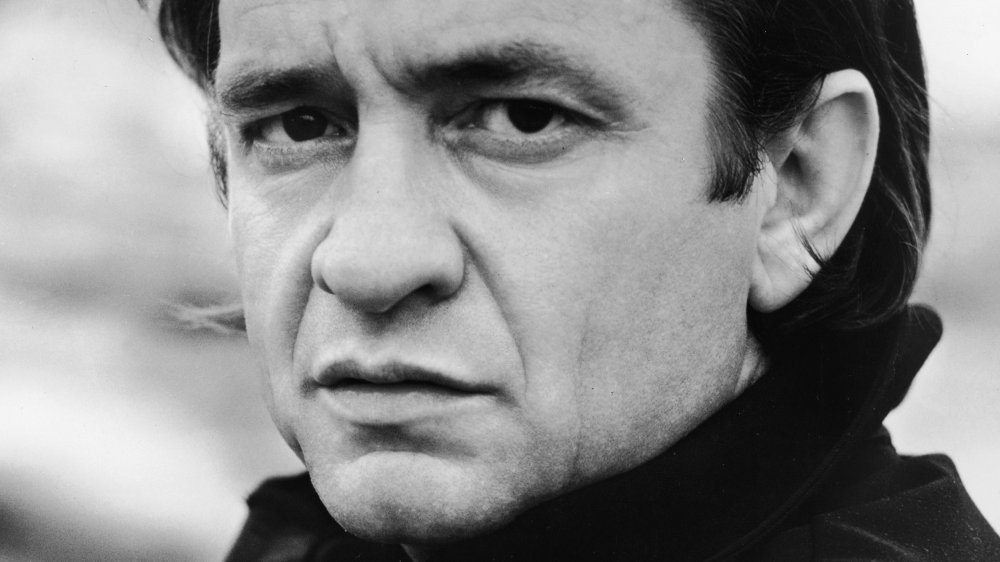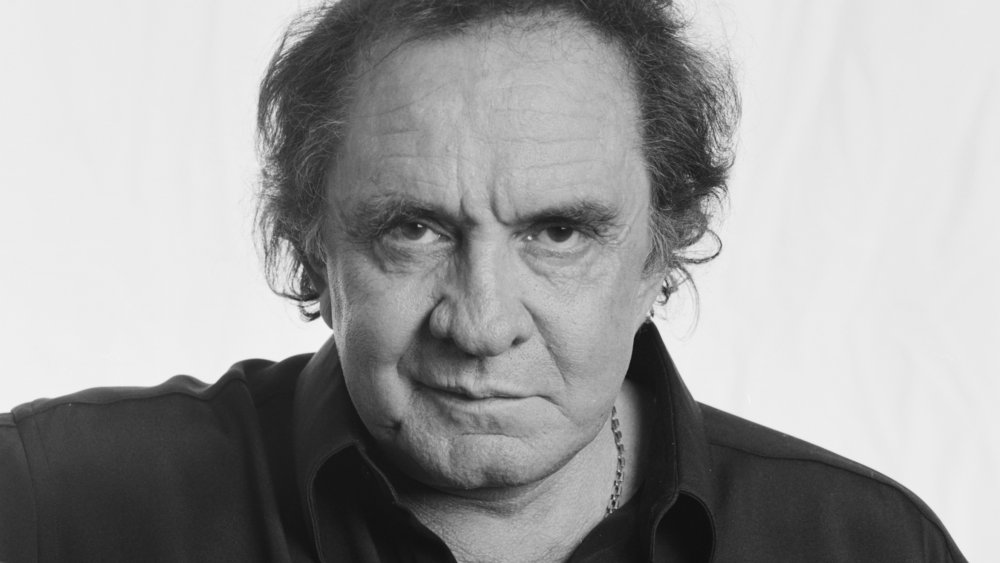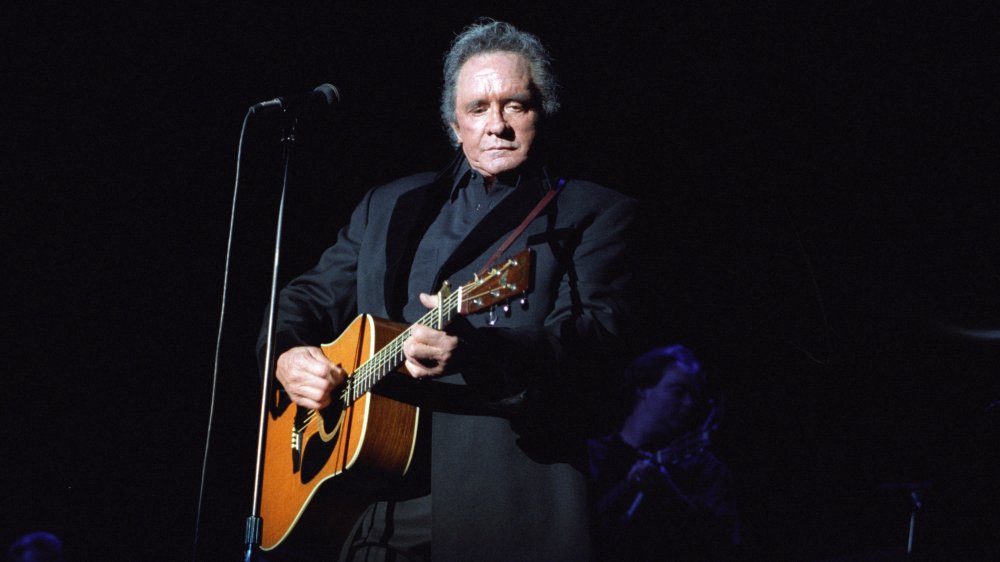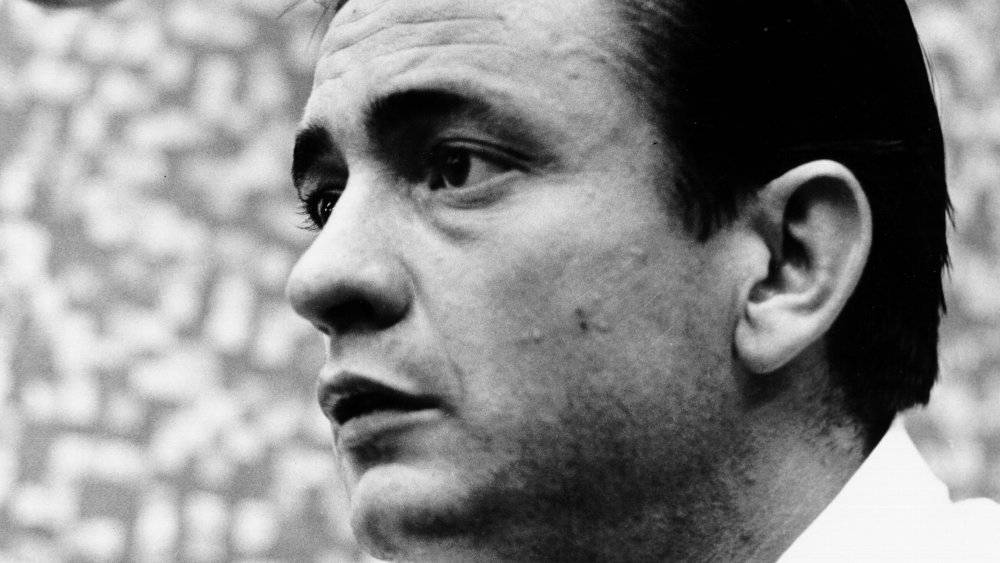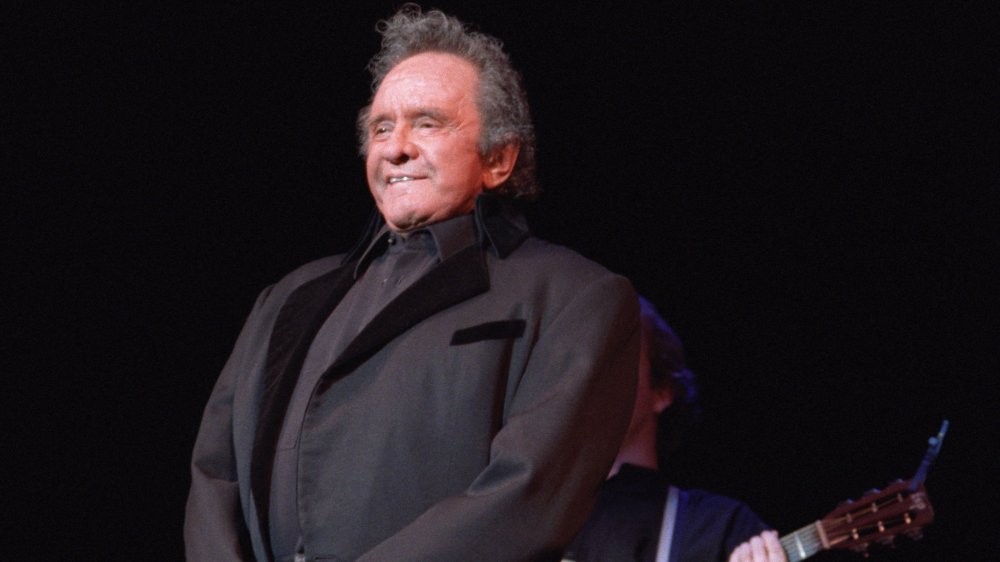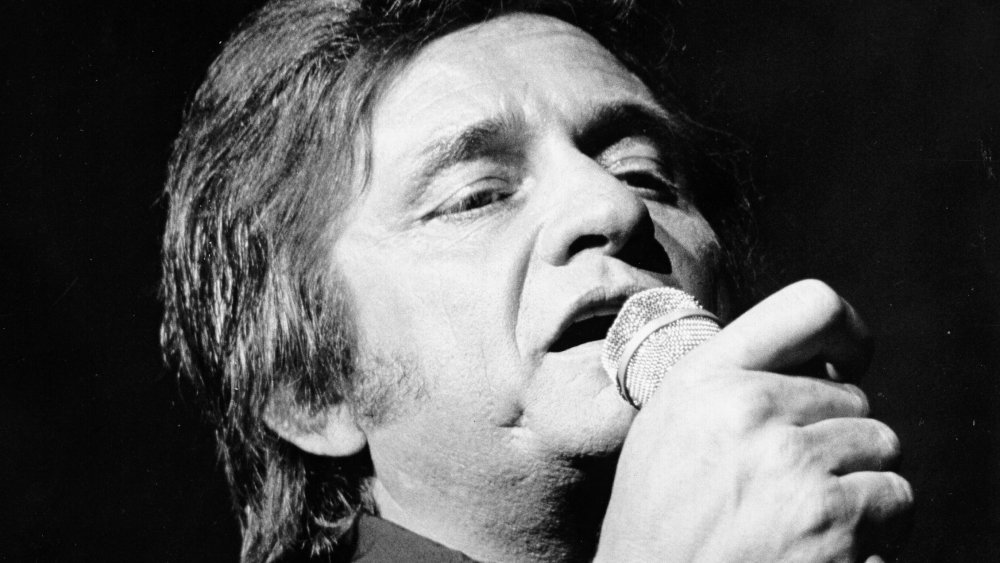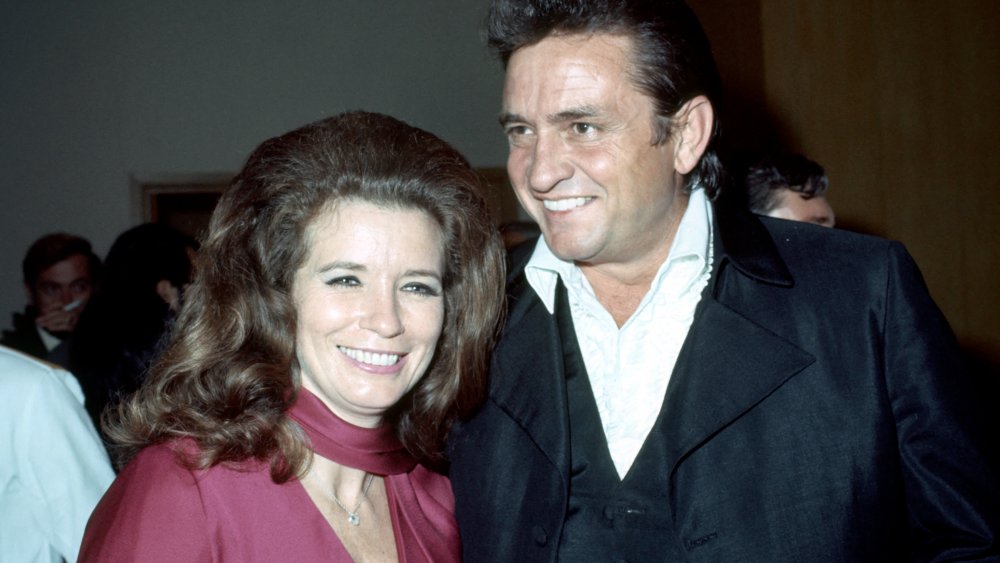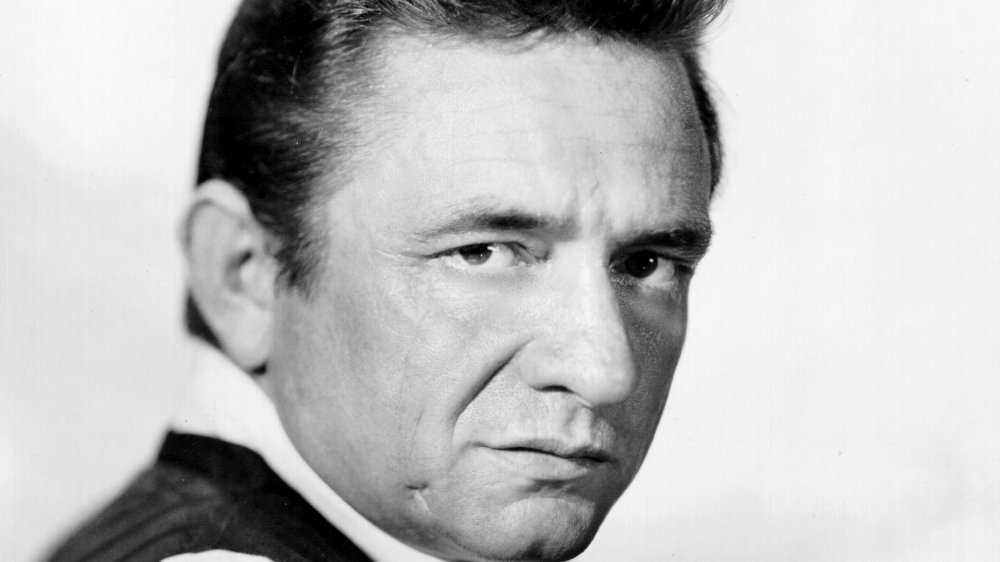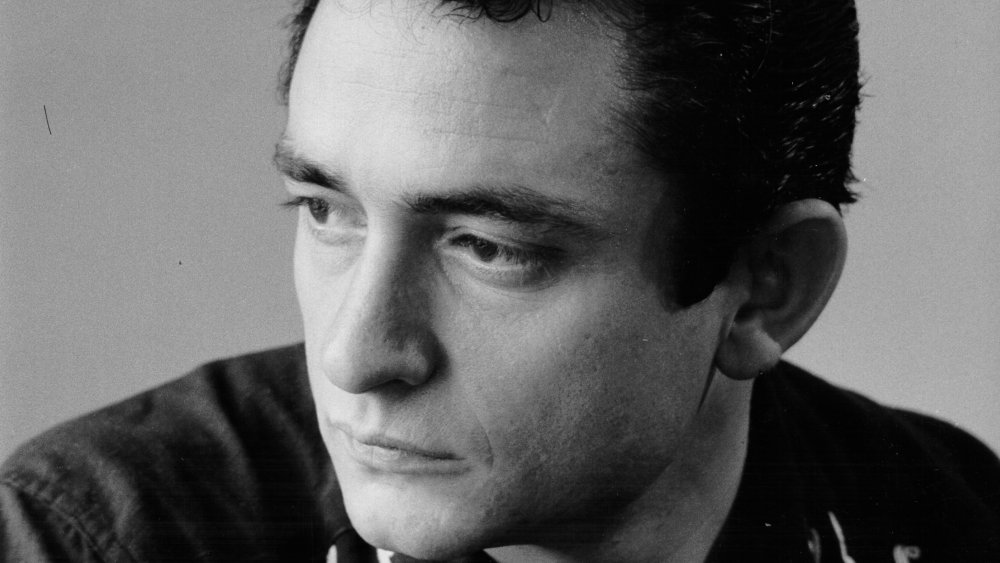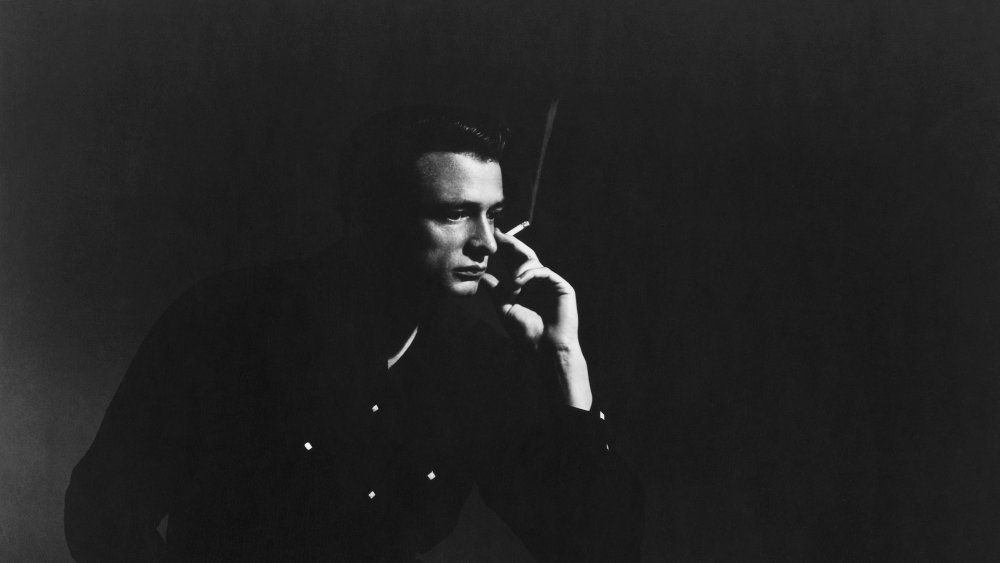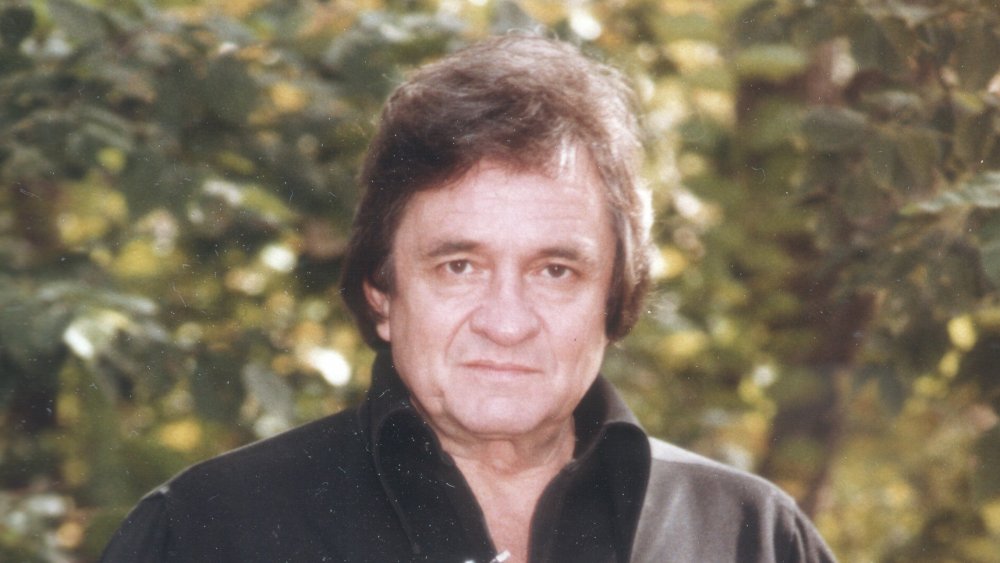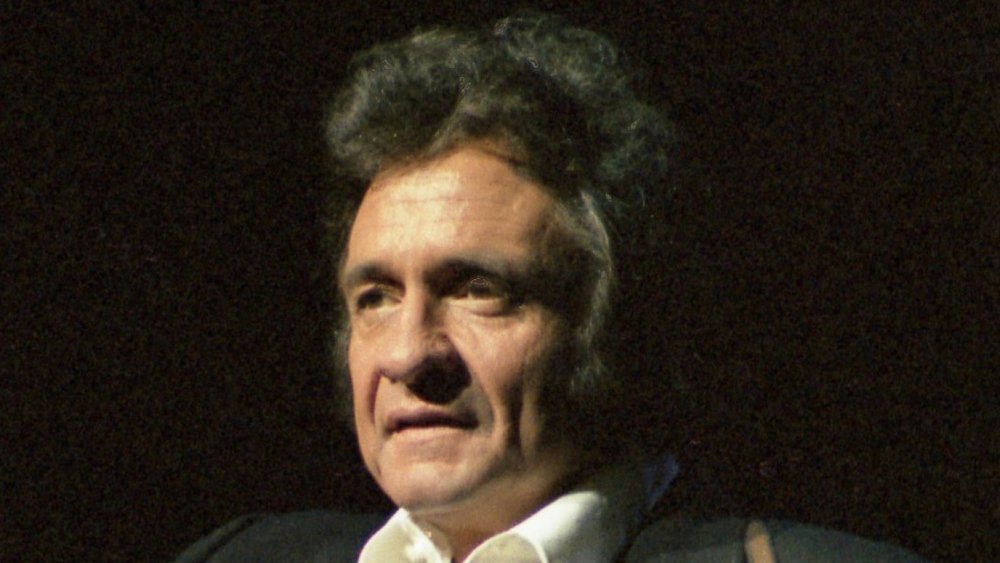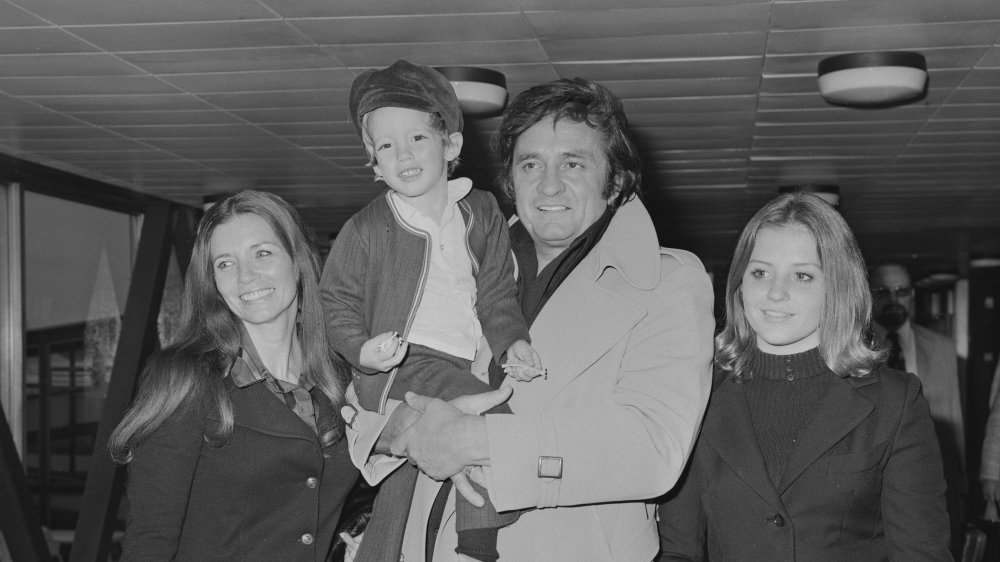What The Final 12 Months Of Johnny Cash's Life Were Like
Johnny Cash converts new listeners from just about every generation. From his iconic cover of the Nine Inch Nail's "Hurt" to his country staples like "A Boy Named Sue," "Ring of Fire," and "I Walk The Line," the singer has left behind an unmatched legacy in the entertainment industry. What set Cash's deep bass-baritone apart was the fact that he was versatile, dabbling in several genres including rock, blues, folk, and country. His music was often a reflection on pain and redemption, things the musician didn't shy away from in his personal life. Cash came from humble beginnings and worked hard to launch his career, choosing to make music until the very end of his life despite several physical obstacles.
Sadly for Cash, his final year was filled with pain and turbulence as he struggled to continue working on his passion and record his last records for his fans. Still, Cash's indomitable spirit and outlaw persona remained strong in his last months. Here's a look at Johnny Cash's final year.
Johnny Cash's health issues were prevalent
Johnny Cash spent a majority of the 1990s impeded by health issues. While he was originally misdiagnosed with Shy-Drager syndrome, his doctors later diagnosed him with autonomic neuropathy in 2000, a complication of his diabetes. According to Johnny Cash: The Biography by Michael Streissguth, his neuropathy often resulted in bouts of pneumonia that forced him to spend a lot of time in the hospital. In 2002, after he finished recording for Wildwood Flower, an album that he contributed to with his wife, June Carter, he fell ill again. By this time, he was finding it tricky to walk properly and had trouble with his eyesight too. He was taken to the hospital for what seemed to be an allergic reaction.
Musician Merle Haggard told Rolling Stone, "We knew he'd been sick, and we'd thought he was going to die so many times over the last couple years — if you want to get really serious, he'd been near death for decades Johnny Cash lived in constant, serious pain."
Cash remained stoic
Although Johnny Cash was in severe pain in the last year of his life and struggled to get things done, he remained stoic and kept his pain to himself, preferring to distract himself with work. As Haggard explained to Rolling Stone, "On a scale of one to ten, it was somewhere around an eight for the last eight years of his life." Haggard added that Cash didn't take care of himself and didn't eat well for a while, which made his bones brittle. The musician also broke his jaw during dental surgery and never quite recovered from it. "He lived as an example of a man in pain, going from one stage of bad health to another, but he held his head up the whole way," Haggard said.
All Cash wished to do was work on his next album as his health issues grew increasingly worse. Haggard's thoughts were echoed by Cash's friend and music producer, Rick Rubin, who said that Cash somehow could still record and keep his spirits high. "One of his qualities was that he would never really talk about ... pain or if he wasn't doing well, so we never really knew other than when it got so bad that he would say, 'I can't sing anymore now. I have to lay down for a little while.'"
Johnny Cash was still busy working
In his final months, Johnny Cash was committed to music and didn't wish to stop producing albums and singing live. He was very active in the industry and worked tirelessly on his last album, American IV: The Man Comes Around. In fact, Cash produced as many as 60 songs in his last four months.
The recording process was not easy, as Cash struggled with complications from neuropathy. As NME explains, Johnny Cash was acutely aware of his shortcomings around that time. "Sometimes I came to the studio and I couldn't sing," Cash said. "I came in with no voice when I could have stayed at home and pouted in my room and cried in my beer or my milk, but I didn't let that happen." His 2002 album, American IV: The Man Comes Around, was a labor of love for the musician. "We put more blood, sweat, and tears and love into this one than anything we've ever done. It reaches out even farther and in more directions than the others did," Cash said. As Vanity Fair reported, Cash recorded from either his cabin tucked away in the woods or even from his bed. His voice quavered on American IV. Cash greatly worried about the difference in his tone.
Cash decided to cover "Hurt"
Widely regarded as one of his most heart-wrenching covers, Cash's version of the Nine Inch Nails song, "Hurt" was released in 2003. Filmmaker Mark Romanek, according to the Independent, was enthusiastic about Cash's version and wished to work with him on a video. "I begged Rick Rubin to let me shoot something to that track," Romanek said in an interview with Dave Urbanski in The Man Comes Around: The Spiritual Journey of Johnny Cash. Romanek flew to Nashville and decided to film in Cash's home and museum in Nashville. "It had been closed for a long time," Romanek recalled. "The place was in such a state of dereliction. That's when I got the idea that maybe we could be extremely candid about the state of Johnny's health — as candid as Johnny has always been in his songs."
The video was a massive hit, striking a chord with viewers. However, what many don't know is that Cash's family was initially unsure about the video. One of Cash's daughters, Rosanne, said, "I didn't want to watch it because we were already in that space of years of intense anxiety about my dad's health and this fear that he was going to die at any moment." Additionally, the family and producer Lou Robin asked Romanek to edit the video and change the final cut to make it less maudlin.
Cash won his final Grammy Award
In 2002, Johnny Cash released an updated version of an earlier track, "Give My Love to Rose," and earned his final Grammy award for it in 2003. The song was originally produced in 1957 for Sun Records, and Cash chose to revisit it many times in his career. In an interview with Rolling Stone, Cash's daughter, Rosanne said, "My father when he would call my mother from the road he would say, "Give my love to Rosanne." So I think that's probably where it came from. I never asked him outright."
As per People, Cash won the award in his last year for "Best Male Country Vocal Performance" and was also nominated in two other categories for his work on American IV: The Man Comes Around (Best Contemporary Folk Album) and his rendition of the Simon and Garfunkel hit, "Like a Bridge Over Troubled Water" (Best Country Collaboration With Vocals).
According to the official website of the Grammy Awards, Cash earned several accolades throughout his career as a musician, notching up as many as 13 Grammy wins (including two posthumous wins). Cash was celebrated over six decades, making history for his contributions to country music.
Johnny Cash lost the love of his life
One of the most heartbreaking moments Johnny Cash lived through in his last year was losing his wife, June Carter, to heart failure. "It was so shocking to think — you know, all of our anxiety had been focused on Dad for 10 years, and the whole time she was slipping away," Rosanne Cash told Vanity Fair.
Rick Rubin recalled speaking to Cash after June's death. "I spoke to Johnny maybe a half-hour or an hour after she passed away," Rubin said. "And he sounded, by far, the worst I'd ever heard him. He sounded terrible. He said that he'd experienced so much pain in his life and that nothing came anywhere near to how he was feeling at that moment." Rubin tried to comfort his friend and urged him to find some faith in himself. According to Johnny Cash: The Biography, everyone feared for the musician after June's passing and believed that he wouldn't be able to go on after her demise.
To cope, Cash spent most of his energy on work. "It actually got more intense after June died," Rubin said. "Because before, we always worked kind of casually, either whenever we had a song or whenever he felt like recording. Now he said to me, 'I want to work every day, and I need you to have something for me to do every day. Because if I don't have something to focus on, I'm gonna die.'"
Cash started relying on his family
To get through the days and cope with his inner demons, Johnny Cash started relying on his kids. He often suffered through bouts of insomnia after June's death and found himself asking for help. As explained in Johnny Cash: The Biography, he couldn't help grieving and crying when he was at home and pining for his wife of 35 years. One of his daughters, Cindy Cash, was visiting him from Mississippi when he told her to stay and not leave him by himself. "He would not let me leave," she said. "I was only going to stay for a couple of weeks, and I ended up not leaving at all. Every day he would say, 'You're not leaving, right?' He was like a little boy again."
As Cash fought insomnia, he asked his children to calm him down. His daughter, Kathy, recollected how difficult it was for him to get rest. She'd tell him stories and talk to him until he found himself drifting away.
Johnny Cash's last performance was heartbreaking
Two months before he died, Johnny Cash held his last live performance. On July 5, 2003, Cash's performance with his band lasted all of half an hour. Even though the singer was frail and couldn't even get to the stage without help, his spirit remained undiminished. Cash and his band belted out several of his most beloved hits including "Ring of Fire," "I Walk the Line," and "Folsom Prison Blues."
According to FarOut magazine, Johnny Cash made a moving statement as he paid a tribute to his late wife on stage. "The spirit of June Carter overshadows me tonight," Cash said. "With the love she had for me and the love I have for her, we connect somewhere between here and heaven. She came down for a short visit tonight, I guess, from heaven, to visit with me tonight and give me courage and inspiration, like she always has."
Fittingly, the venue of the performance was the Carter Family Fold in Hiltons, Virginia, where June Carter's family had hosted regular country and bluegrass concerts since 1979. Johnny Cash had become a vital part of the family and worked with them on several songs before he married June. The Carter Family Fold's "no electric instruments" rule was often waived when Cash performed.
Cash didn't stop recording until the very end
After he lost June, Johnny Cash decided to throw himself into work and focus on music. According to Rolling Stone, Cash got back to work three days after June passed away. Rick Rubin reflected on Cash's state of mind in those days. "He said, 'I don't want to do any of the things some people do when they lose their partner — I don't want to go out and spend a lot of money. I don't want to meet girls. I don't want to do anything of this world. I want to make music and do the best work I can. That's what she would want me to do, and that's what I want to do,'" Rubin explained.
There were days when his health wouldn't allow him to work. However, Cash would find ways to get back to recording as soon as he felt better. He even started recording with Rubin in his home when he simply didn't have the strength to head out. "The last session that I did, two or three months ago, was in one of the bedrooms," Rubin said. "The last six months, we were recording really heavy old blues-based things like 'Ain't No Grave Gonna Hold My Body Down' and 'John the Revelator.'"
Cash was too unwell to attend the MTV awards
The Man in Black made history at MTV's Video Music Awards with six nominations to his name in August 2003. He won an award for his take on "Hurt" but couldn't make it to the ceremony. As per Entertainment Weekly, the singer was in the hospital where he'd been taken to treat pancreatitis. It took him two full weeks to recover and get back home.
When he returned, he commented on the award and said, "I'm excited about my video 'Hurt' winning the MTV cinematography award. The making of the video was a great experience for me." Johnny Cash, despite being nominated in other categories, didn't rack up more wins. Justin Timberlake, who won Best Pop Video for his song, "Cry Me a River," said that Cash deserved the honor instead of him and that he'd looked up to the singer since he was a kid. "He got a big kick out of what Justin said. He was very appreciative," Lou Robin said back then, in response to Timberlake.
Cash remained unapologetically himself
Even in his last interview, Cash didn't hesitate to simply be himself and reflected on his unapologetic, candid approach to songwriting. According to FarOut magazine, the singer said in his final interview, "You can't let people delegate to you what you should do," Cash said, pointing to his chest. "When it's coming from way in here, you know? ... I wouldn't let anybody influence me into thinking I was doing the wrong thing by singing about death, hell, and drugs."
A July 2003 interview that was conducted with TIME magazine was just as heart-wrenching and honest. When he was asked about his future plans and his idea of faith, he said, "Oh, I expect my life to end pretty soon ... I have great faith, I have unshakeable faith, I've never been angry at God, I've never turned my back on God. All of the good things in my life come from him."
Johnny Cash's death had tributes pouring in from all over the world
The iconic Johnny Cash died on September 12, 2003, after suffering from respiratory failure due to complications from diabetes. Cash's passing came just four months after his wife June Carter Cash's death. Passing away at Baptist Hospital in Nashville, Tennessee, the 71-year-old singer had been struggling with his health for decades. Earlier in his career, Cash had struggled with addiction to alcohol, amphetamines, and barbiturates and had been treated in rehab facilities in the 1980s and 1990s. Cash's romantic conviction, as well as his grim realism, remained alive in his work.
U2's lead singer Bono remembered the legend and told BBC, "I considered myself a friend, he considered me a fan — he indulged me." Mick Jagger from the Rolling Stones also paid his respects to the singer and commented, "His influence spread over many generations of different people. I loved him as singer and a writer."
Fans prayed for Johnny Cash and his wife, hoping that the two were finally together as they mourned their loss. His daughter, Rosanne Cash, expressed her grief, "I can almost live in a world without Johnny Cash because he will always be with us," she said. "I cannot begin to imagine a world without daddy."
